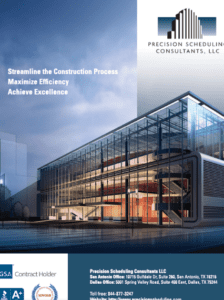Construction delays often trigger disputes. Owners blame contractors, while contractors blame subcontractors or designers. Without solid evidence, these disputes can escalate into costly legal battles. In these situations, the side presenting the best data typically wins.
That’s where forensic schedule analysis becomes essential in proving what actually happened on the project. Forensic schedule analysis reconstructs the project timeline. This process identifies causes of delays, assigns responsibility, and quantifies impacts using concrete data.
Here’s how forensic schedule analysis works and why it matters for delay claims.
What Is Forensic Schedule Analysis?
Forensic schedule analysis is a systematic method that dissects project records to:
– Identify Delays: Was the delay caused by weather, late approvals, or low productivity?
– Assign Responsibility: Who is at fault—owner, contractor, or external factors?
– Quantify Impacts: How many days were lost, and what were the associated costs?
This scientific approach transforms ambiguous disputes into data-driven evidence useful in negotiations, mediation, or court.
How Forensic Schedule Analysis Proves Delays in Disputes
1. Reconstructs the “But For” Scenario
The key question here is, “Where would the project stand without the delay?”
- It compares the original baseline schedule to as-built records.
- It utilizes methods such as the critical path method (CPM) to pinpoint delays affecting completion.
For instance, if late design approvals delayed the structural steel, forensic analysis reveals how these approvals pushed back interconnected activities.
2. Separates Excusable from Compensable Delays
Not all delays carry the same weight. Forensic analysis categorizes delays into:
– Excusable (Non-Compensable): Examples include acts of nature or strikes.
→ Here, contractors receive extra time but no financial compensation.
– Compensable (Owner-Caused): Late drawings and permit delays fall under this category.
→ In this case, contractors can pursue both time extensions and cost recovery.
– Concurrent Delays: When both parties share blame, forensic analysis allocates responsibility accordingly.
3. Validates or Discredits Claims
Many delay claims rest on assumptions rather than facts. Forensic analysis reveals:
- Phantom Delays: Alleged impacts that do not actually affect the project’s critical path.
- Poor Documentation: Issues like gaps in reports or missing change orders.
- Self-Inflicted Delays: Mismanagement by the contractor presented as owner liability.
4. Quantifies Financial Impacts
Delays fundamentally impact budgets. Forensic analysis calculates
- Extended overhead costs, such as trailers and insurance.
- Labor inefficiencies, including rework or crew stacking.
- Acceleration costs, such as overtime and expedited materials.
Without this level of detail, contractors often struggle to recover even a fraction of their losses.
Precision’s Construction Claims Services
- Construction Delay Claims
- Forensic Schedule Analysis
- Construction Defects
- Construction Damage Calculations
- Request for Equitable Adjustments (REA)
- Loss of Productivity Analysis (LoP)
- Expert Witness Testimony
When Should You Consider Forensic Schedule Analysis?
– Dispute Resolution: Essential for arbitration or litigation.
– Insurance Claims: Useful in proving delay impacts for builders’ risk.
– Terminated Contracts: Critical for defense against backcharges or wrongful termination claims.
Real-World Example:
Consider a contractor engaged in a $200M hospital project experiencing 14 weeks of delays due to late owner decisions. The owner denied responsibility, attributing delays to contractor mismanagement.
The Bottom Line: Without Forensic Analysis, You Risk Guessing
Owners, courts, and arbitrators base decisions not on persuasive arguments but on who presents the strongest evidence.
At Precision Scheduling Consultants, we excel in:
– Forensic Schedule Investigations: Uncovering evidence often overlooked.
– Time Impact Analysis (TIA): Accurately quantifying delays.
– Expert Testimony: Delivering robust findings in disputes.
Don’t gamble with your delay claim.
Get a Free Case Assessment—Determine If Your Claim Has Merit

